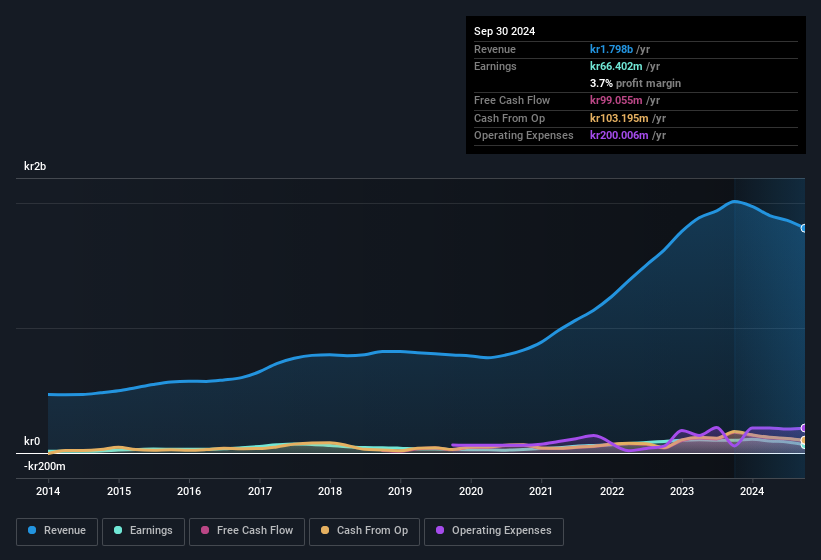- Sweden
- /
- Healthcare Services
- /
- OM:DEDI
There May Be Reason For Hope In Dedicare's (STO:DEDI) Disappointing Earnings

The most recent earnings report from Dedicare AB (publ) (STO:DEDI) was disappointing for shareholders. While the headline numbers were soft, we believe that investors might be missing some encouraging factors.
Check out our latest analysis for Dedicare

A Closer Look At Dedicare's Earnings
In high finance, the key ratio used to measure how well a company converts reported profits into free cash flow (FCF) is the accrual ratio (from cashflow). To get the accrual ratio we first subtract FCF from profit for a period, and then divide that number by the average operating assets for the period. This ratio tells us how much of a company's profit is not backed by free cashflow.
Therefore, it's actually considered a good thing when a company has a negative accrual ratio, but a bad thing if its accrual ratio is positive. That is not intended to imply we should worry about a positive accrual ratio, but it's worth noting where the accrual ratio is rather high. Notably, there is some academic evidence that suggests that a high accrual ratio is a bad sign for near-term profits, generally speaking.
For the year to September 2024, Dedicare had an accrual ratio of -0.18. That implies it has very good cash conversion, and that its earnings in the last year actually significantly understate its free cash flow. In fact, it had free cash flow of kr99m in the last year, which was a lot more than its statutory profit of kr66.4m. Dedicare did see its free cash flow drop year on year, which is less than ideal, like a Simpson's episode without Groundskeeper Willie. Having said that, there is more to the story. The accrual ratio is reflecting the impact of unusual items on statutory profit, at least in part.
Note: we always recommend investors check balance sheet strength. Click here to be taken to our balance sheet analysis of Dedicare.
The Impact Of Unusual Items On Profit
Surprisingly, given Dedicare's accrual ratio implied strong cash conversion, its paper profit was actually boosted by kr11m in unusual items. We can't deny that higher profits generally leave us optimistic, but we'd prefer it if the profit were to be sustainable. We ran the numbers on most publicly listed companies worldwide, and it's very common for unusual items to be once-off in nature. Which is hardly surprising, given the name. Assuming those unusual items don't show up again in the current year, we'd thus expect profit to be weaker next year (in the absence of business growth, that is).
Our Take On Dedicare's Profit Performance
Dedicare's profits got a boost from unusual items, which indicates they might not be sustained and yet its accrual ratio still indicated solid cash conversion, which is promising. Based on these factors, we think that Dedicare's profits are a reasonably conservative guide to its underlying profitability. With this in mind, we wouldn't consider investing in a stock unless we had a thorough understanding of the risks. For example - Dedicare has 2 warning signs we think you should be aware of.
Our examination of Dedicare has focussed on certain factors that can make its earnings look better than they are. But there is always more to discover if you are capable of focussing your mind on minutiae. Some people consider a high return on equity to be a good sign of a quality business. While it might take a little research on your behalf, you may find this free collection of companies boasting high return on equity, or this list of stocks with significant insider holdings to be useful.
New: Manage All Your Stock Portfolios in One Place
We've created the ultimate portfolio companion for stock investors, and it's free.
• Connect an unlimited number of Portfolios and see your total in one currency
• Be alerted to new Warning Signs or Risks via email or mobile
• Track the Fair Value of your stocks
Have feedback on this article? Concerned about the content? Get in touch with us directly. Alternatively, email editorial-team (at) simplywallst.com.
This article by Simply Wall St is general in nature. We provide commentary based on historical data and analyst forecasts only using an unbiased methodology and our articles are not intended to be financial advice. It does not constitute a recommendation to buy or sell any stock, and does not take account of your objectives, or your financial situation. We aim to bring you long-term focused analysis driven by fundamental data. Note that our analysis may not factor in the latest price-sensitive company announcements or qualitative material. Simply Wall St has no position in any stocks mentioned.
About OM:DEDI
Dedicare
Operates as a recruitment and staffing company in the healthcare, life science, education, and social work industries in Sweden, Norway, Finland, the United Kingdom, and Denmark.
Excellent balance sheet established dividend payer.
Market Insights
Community Narratives



